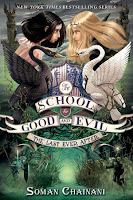(In which the road to Ever After is always a difficult battle.)
***
Reading this book late at night gave me pimples. And all I can give it back is a blog post.
I can no longer clearly recall the details from the first two books of this series. If you need some refresher, click here for The School for Good and Evil book review.
Or maybe just watch this.
For The School for Good and Evil: A World Without Princes book review, click here.
And watch this, too.
If there is something about the first two books that strongly left me (and I say this with no remorse whatsoever) it's that I hate Sophie with a passion. And for good reason. She was a user and an abusive "bestfriend" to Agatha. Why and how Agatha fails to realize that Sophie is worse than a frenemy is beyond me (even after finishing the series). Or maybe I'm the close-minded one.
So it is no surprise how the first several chapters of this book began: Sophie is back on finding an ending befitting a princess for herself. And (insert adjective here) Agatha is always right there to clean up the mess.
When the School Master (whom everyone thought was Good, only to be revealed as Evil) took Sophie to his fortress after he almost killed Tedros, Sophie was left with a decision to either take the ring he offers her as a sign of their true, undying love, or let the sun die and the world along with it.
So she took the ring.
Only the ring makes the School Master (whose real name is Rafal) immortal as long as Sophie is wearing it. Sophie (is once again) deceived in her relentless pursuit of being a queen of a handsome boy from whatever kingdom.
And Agatha and Tedros' mission is, of course, to convince Sophie to destroy the ring herself (since no one else can) using the Excalibur and save the world.
And that was easier said than done. Unfortunately, time is running out. Evil also wanted their own happy ending. Villains are killing their Good nemeses.
The last book of Soman Chainani's series seems like something straight out of a Tolkien novel with some Filipino soap opera plot staples. But the backstories of famous fairy tales can definitely give Hollywood fairy tale reboots a run for their money – which is good since it's going to be turned into a movie soon.
Despite its childish façade, The Last Ever After insisted on the point that experience kept on emphasizing: that the obsessive pursuit of happiness is a trap sure to end in tragedy. True. Some parts of the story kept on transporting readers from suspending-disbelief to utter-disbelief zones ... and back. But it's a huge solace to know that love wins every time.
And just like the first two posts for this series, here's the wickedly transfixing book trailer.
Currently reading:
Photo sources:

